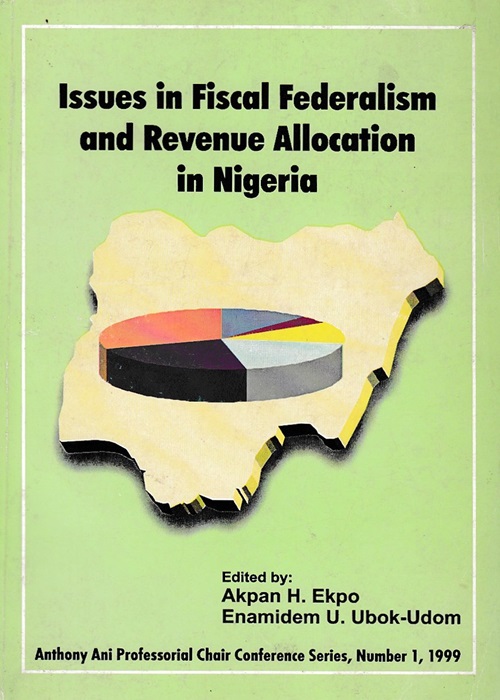Issues in Fiscal Federalism and Revenue Allocation in Nigeria by Akpan H. Ekpo and Enamidem Ubokudom
$10.00
Preface
This book contains the edited versions of papers presented at the first conference organized under the Chief Anthony Ani Professorial Chair in Public Finance, Department of Economics, University of Uyo. The conference, a one-day round table discussion on “Fiscal Federalism: The Political Economy of Revenue Allocation”, was held on November 24, 1999 at the Anthony Ani Conference Room, University of Uyo. Various
factors, particularly unavailability of funds, combined to delay till date the publication of this volume of the scholarly papers that were presented and discussed at the conference.
Each of the seventeen chapters that make up this book is a revised version by the author(s) of a paper presented at the conference. The book is divided into six parts covering
General Issues, Social and Environmental Issues, Inter-governmental Fiscal Relations, the Role of Fiscal Policy, the Derivation Principle, and the Impact of (fiscal federalism and revenue allocation) on Economic Growth and Welfare. The materials treated in the chapters necessarily overlap to some extent, although each article focuses on some special aspect of the revenue allocation problem of the Nigerian federation.
Although no communique was issued at the end of the conference, these papers reveal a clear consensus for:
- (i) the effecting of true fiscal federalism in a system embodying substantial fiscal autonomy and fiscal independence of the
federating units,
- (ii) a re-emphasis of the derivation principle for all major sources of revenue going into the Federation Account to promote competitive development of the Nigerian economy by the federating units,
- (m) the redressing of long years of neglect of the oil-producing areas, and
- (iv) the use of fiscal federalism in Nigeria to promote general economic growth and development.
In all, the book is a very good source of data and analytical information on the political, economic and social issues involved in the history and current direction of revenue allocation in Nigeria. Students and teachers of the subject in the social sciences and in general studies courses will find the book invaluable in their various areas of interest. Similarly, officers in government will find the well thought-out analysis of issues on revenue allocation, and the implementation of policies towards areas producing revenue-yielding resources, like the Niger Delta Development Commission of great benefit in defining the specifics of their duties. This highly informative book would update the general reader concerned about the problems of revenue allocation in Nigeria.
Akpan H. Ekpo | Enamidem U. Ubok-Udom
Description
Contents
PART I: GENERAL ISSUES
- CHAPTER ONE: Keynote Address by Prof Fola Lasisi
- CHAPTER TWO: An Overview of Revenue Allocation in Nigeria by Akpan H. Ekpo.
- CHAPTER THREE: The Economics of Revenue Allocation in Nigeria by Edet B. Akpakpan.
- CHAPTER FOUR: The Politics of Revenue Allocation in Nigeria by Festus O. Egwaikhide and Akpan H. Ekpo.
PART II: SOCIAL AND ENVIRONMENTAL ISSUES
- CHAPTER FIVE: Role of Institutions in Revenue Allocation: OMPADEC and Others by Tamunopriye J. Agiobenebo.
- CHAPTER SIX: Revenue Allocation: Perspectives from Oil-Producing States by Festus O. Egwaikhide.
PART III: INTER-GOVERNMENTAL FISCAL RELATIONS
- CHAPTER SEVEN: Revenue Allocation in Nigeria during the Military Era by Uwatt B. Uwatt & Okon J. Umoh.
- CHAPTER EIGHT: Revenue Allocation among Federal, State and Local Governments, 1990-1998 by Okon Eminue.
- CHAPTER NINE: Revenue Allocation among State and Local Governments by P. U. Iniodu & P. E. Archibong.
- CHAPTER TEN: The Place of Value Added Tax (VAT) in Revenue Allocation by M. A. Adawo & C. N. Ekong..
- CHAPTER ELEVEN: The 1999 Nigerian Constitution and Revenue Allocation: A Perspective by Y. B. C. Omelle.
PART IV: ROLE OF FISCAL POLICY
- CHAPTER TWELVE: Nigerian Fiscal Policy and Revenue Allocation by John E. Udo Ndebbio.
- CHAPTER THIRTEEN: Property Rights, Fiscal Policy and Revenue Allocation in Nigeria by Paul A. Orebiyi & Nsenam I. Udoka.
PART V: THE DERIVATION PRINCIPLE
- CHAPTER FOURTEEN: Revenue Allocation: Whither Derivation Principle by Umanaette S. Udoh.
- CHAPTER FIFTEEN: Majority Rule over Minority Right: Subversion of Derivation Criterion in Revenue Allocation in Nigeria by Godwin E. Akpan & Enobong C. Umobong.
PART VI: IMPACT ON ECONOMIC GROWTH AND WELFARE
- CHAPTER SIXTEEN: The Consequences of Revenue Allocation for Economic Growth and Development in Nigeria by Enamidem U. Ubok-Udom & Ndem A. Ndiyo.
- CHAPTER SEVENTEEN: Fiscal Federalism, Revenue Allocation Formula and Economic Development in Nigeria by Michael O. Nyong.
This book can also be purchased in Chapters. Click here to select the chapter of choice or key in the title of the chapter in the Search field.
Prof Akpan Ekpo
Questions and Answers
You are not logged in
